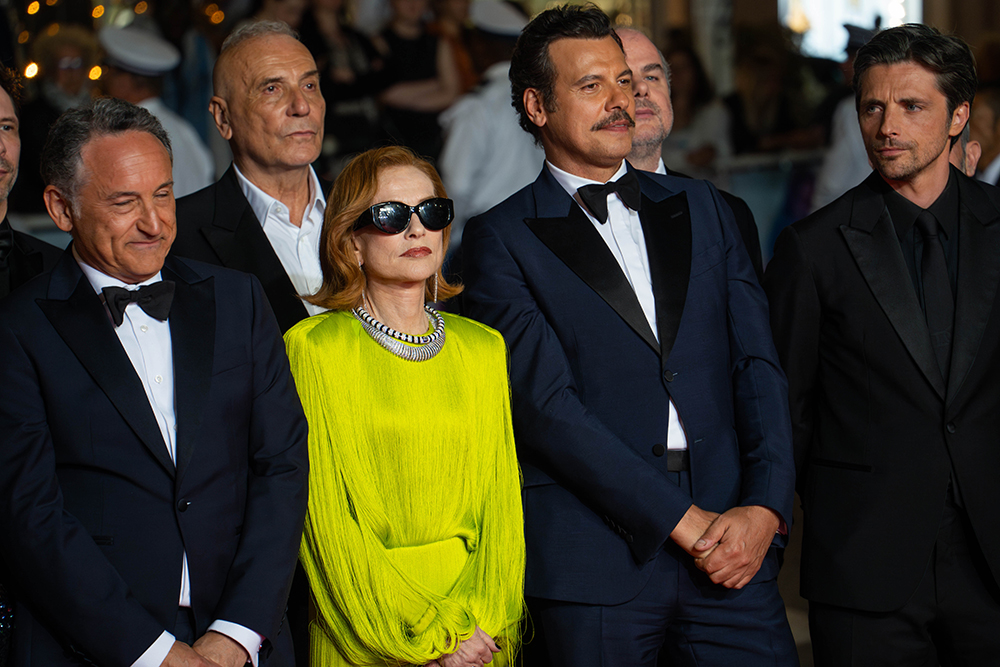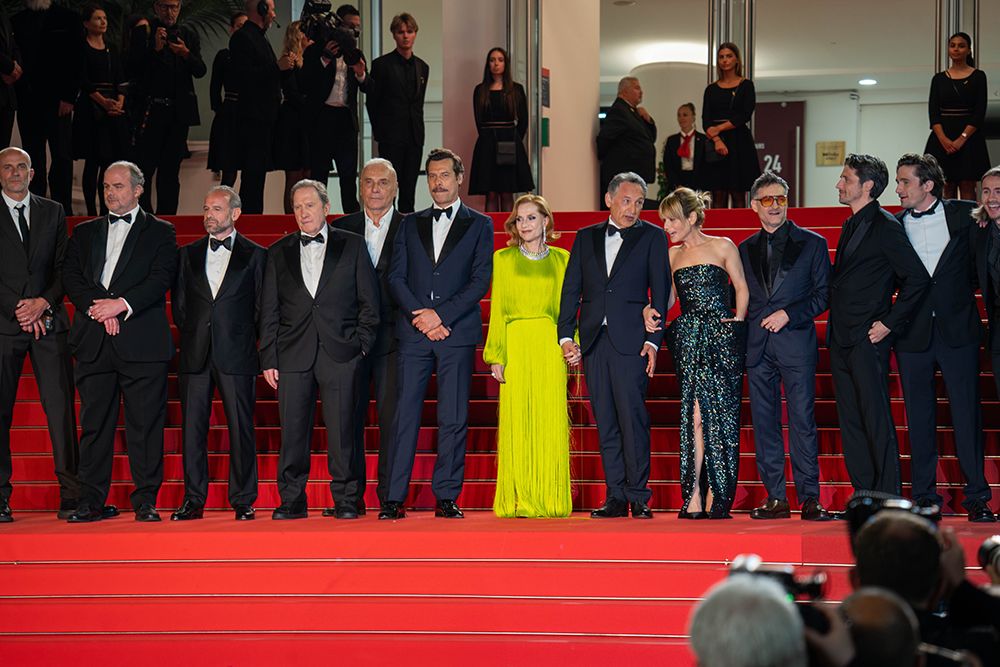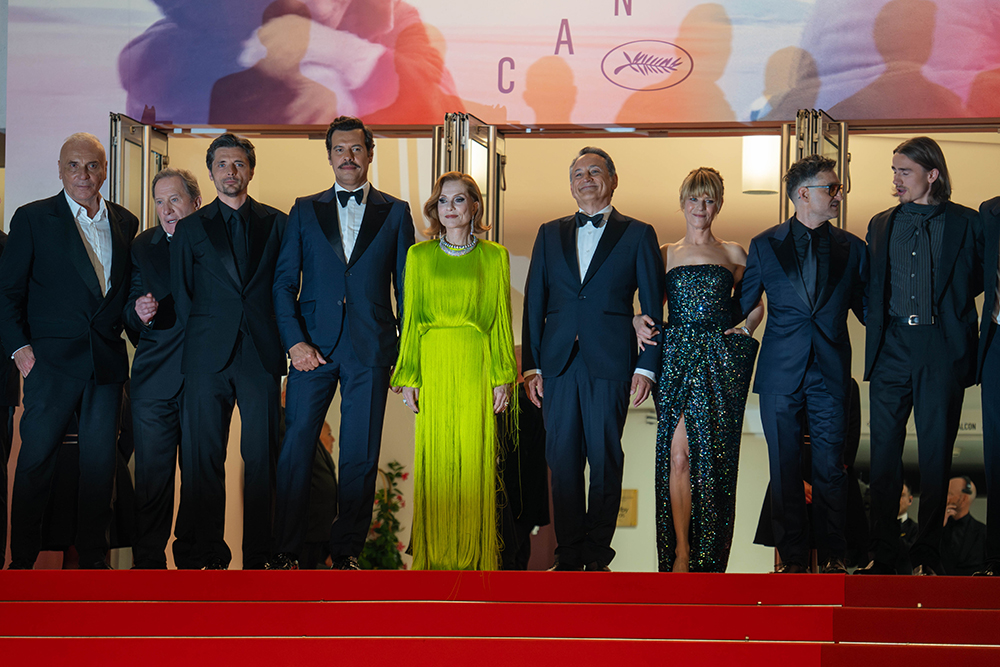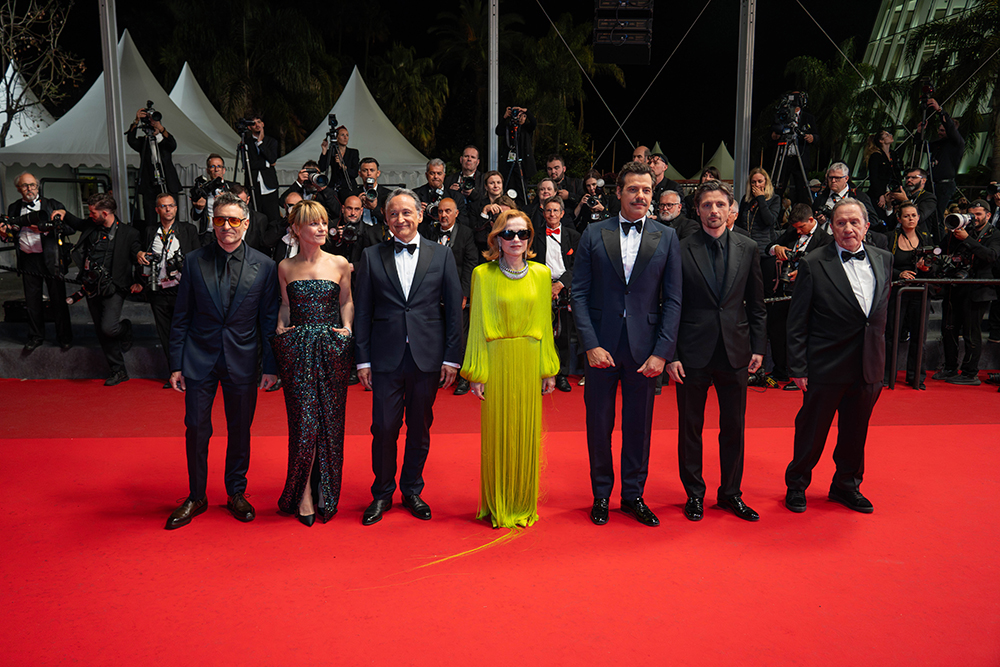Festivals - Cannes 2025 : The Richest Woman in the World Dazzles the Croisette with Isabelle Huppert at Her Most Majestic in Thierry Klifa’s Scandal-Inspired Drama
By Mulder, Cannes, Palais des Festivals et des Congrès de Cannes, 18 may 2025

There are nights at Cannes that feel suspended in time, when the flash of cameras becomes the heartbeat of cinema itself, and May 18, 2025, was unquestionably one of those nights. The 78th Cannes Film Festival welcomed one of its most anticipated out-of-competition premieres, La Femme la plus riche du monde (The Richest Woman in the World), with an air of both mystery and electricity. The red carpet in front of the Palais des Festivals was alight with anticipation as an impressive lineup of French talent made their way to the screening. Legendary actress Isabelle Huppert led the ensemble, joined by Marina Foïs, Laurent Lafitte, director Thierry Klifa, screenwriter Jacques Fieschi, and actors André Marcon and Mathieu Demy. It was a moment steeped in glamour and gravitas, punctuated by a cinematic aura that only Cannes can deliver. Even Diane Kruger, though not part of the film, turned heads with her presence, adding to the sense of occasion.
The film, which was inspired by the infamous Bettencourt-Banier affair, had already stirred considerable intrigue leading up to its debut. And yet, Thierry Klifa's take is no straightforward biopic. Instead, The Richest Woman in the World cleverly transforms scandal into a richly layered psychological drama that dives headfirst into the decadence and deception lurking beneath elite French society. In the film, Huppert plays a reclusive, commanding heiress — a woman whose fortune isolates her, whose heart remains guarded, and whose wealth becomes both a shield and a burden. Enter Laurent Lafitte as a provocative writer-photographer, a man whose charm is matched only by his ambition and veiled intentions. The two collide in a dance of seduction, suspicion, and emotional power plays that unfold in sumptuous interiors and coldly lit boardrooms, all exquisitely captured by cinematographer Hichame Alaouié.

What stands out is how deftly the film explores the fragility of human connection in an environment saturated with privilege. It’s not just about the richest woman in the world; it’s about the emotional poverty that can come with extreme affluence. Thierry Klifa doesn’t romanticize or vilify his characters — he probes them, dissecting their silences and glances as much as their words. In doing so, he crafts a story as much about loneliness and identity as it is about scandal and betrayal. Isabelle Huppert’s performance is predictably mesmerizing. There’s a steeliness to her portrayal, but also an undercurrent of vulnerability that gives the film its emotional resonance. Her eyes speak volumes in scenes where dialogue remains sparse, and her quiet unraveling offers a haunting counterpoint to the ostentatious lifestyle her character leads.
The supporting cast elevates the film to a greater emotional complexity. Marina Foïs brings her signature gravitas to a role that remains enigmatic yet grounded. Raphaël Personnaz and Micha Lescot also contribute fine performances that add tension and nuance. Notably, the character of the butler — a silent observer of the household’s decaying emotional landscape — offers a mirror to the audience, a man who knows far more than he reveals and who bears witness to the slow erosion of trust behind the gilded walls. The screenplay, co-written by Thierry Klifa, Fieschi, and Cédric Anger, avoids melodrama and opts instead for psychological sophistication, weaving family secrets, manipulations, and explosive revelations into a tight 123-minute runtime.

Equally compelling is the score by Alex Beaupain, whose understated musical compositions underscore the film’s emotional fragility rather than overwhelm it. His work here doesn’t intrude but rather envelops — a subtle presence that echoes the psychological depth of the narrative. It’s not just accompaniment; it’s commentary. And in the moments where the music fades entirely, the silence becomes deafening — as though the characters themselves are aware of the invisible walls closing in. Chantal Hymans’ editing is restrained and thoughtful, allowing for long takes that let performances breathe while also sustaining the film’s mounting tension.
What’s particularly notable is that while the film premiered out of competition, it commanded the same level of attention — if not more — than many of the contenders for the Palme d’Or. There’s something liberating about that status; free from the pressures of competition, The Richest Woman in the World seems to lean into its theatricality and narrative risks with even greater confidence. On the Croisette, post-screening discussions echoed well into the night at the bars of the Majestic and Martinez hotels. Some praised Thierry Klifa’s precision, others hailed Huppert’s performance as one of her most enigmatic since Elle. For many, the film served as a reminder that cinema still has the power to dissect the wealthy not just with satire, but with empathy and gravitas.

Beyond its artistic execution, the film resonates for the way it addresses the corruption of affection in a world ruled by status and suspicion. There’s something unsettlingly timely about its themes: how easily love can be commodified, how quickly trust can be weaponized, and how wealth, far from insulating its possessors, can instead entrap them in cages of their own design. It’s in that emotional territory — raw, unpredictable, intimate — that Thierry Klifa stakes his claim. And by centering the film on a woman torn between yearning for genuine affection and fearing exploitation, The Richest Woman in the World elevates itself beyond simple social commentary. It becomes a modern tragedy wrapped in diamonds and denial.
With a French theatrical release set for October 29, 2025, this Cannes premiere feels like the opening salvo of what could be a long awards season run — or at the very least, a richly debated work in cinephile circles. Whether you read it as a critique of France’s elite, a gothic romance, or an operatic character study, La Femme la plus riche du monde has already left an imprint on this year’s festival. And in the process, it’s reaffirmed Cannes’ singular role in showcasing films that both provoke and enthrall. As the last of the evening gowns disappeared into the night and the Croisette began to quiet down, one thing became clear: this film may be about the richest woman in the world, but its true wealth lies in the depth of its storytelling.

You can discover our photos in our Flickr page
Synopsis :
The richest woman in the world: her beauty, her intelligence, her power. A writer and photographer: his ambition, his insolence, his madness. Love at first sight sweeps them off their feet. A mistrustful heiress fighting to be loved. A watchful butler who knows more than he lets on. Family secrets. Astronomical donations. A war where anything goes.
The richest woman in the world (La Femme la plus riche du monde)
Directed by Thierry Klifa
Produced by Mathias Rubin
Written by Cédric Anger, Jacques Fieschi, Thierry Klifa
Starring Isabelle Huppert, Laurent Lafitte, Marina Foïs, Raphaël Personnaz, André Marcon, Mathieu Demy, Joseph Olivennes, Micha Lescot, Paul Beaurepaire, Yannick Renier, Anne Brochet, Douglas Grauwels
Music by Alex Beaupain
Cinematography : Hichame Alaouié
Edited by Chantal Hymans
Production companies : Recifilms, Versus Production, 7 SOFICA
Distributed by Haut et Court (France)
Release date : 18 mai 2025 (Cannes), October 29, 2025 (France)
Running time : 123 minutes
Photos : @fannyrlphotography

